Top 11 Free Code Editors
1. Visual Studio Code
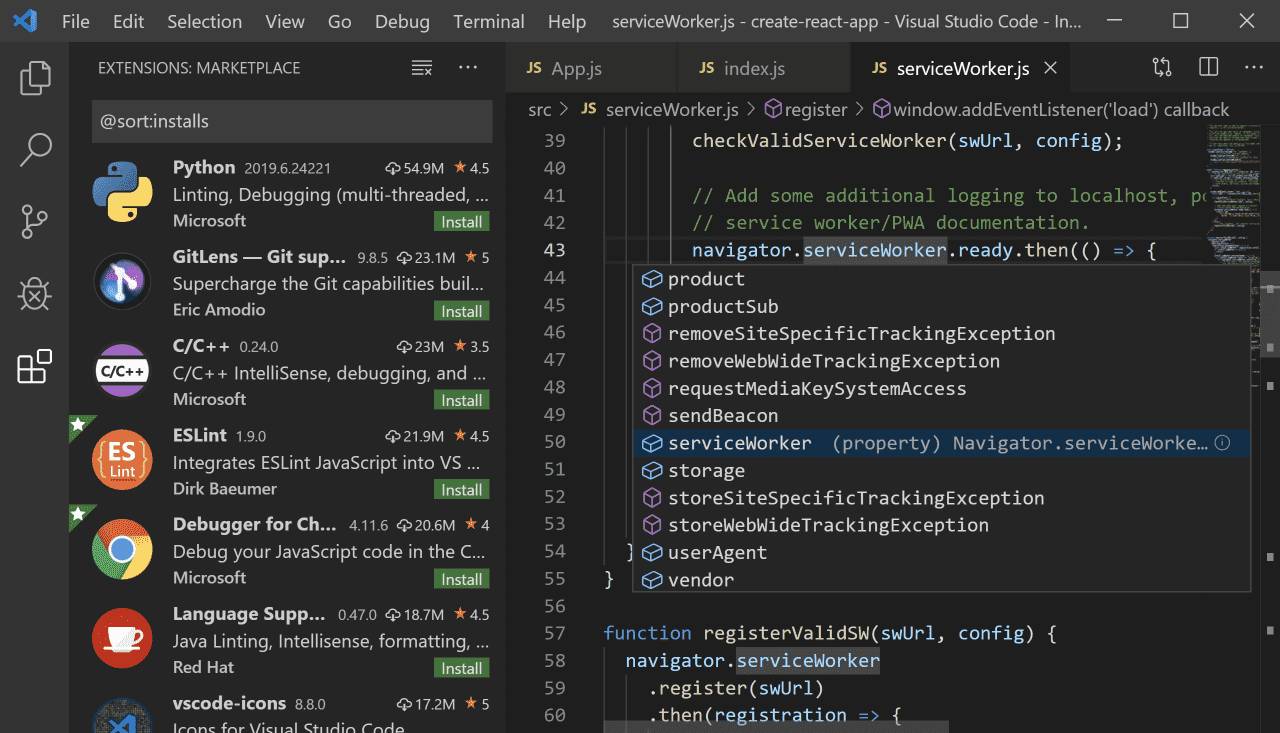 Visual Studio Code (or VS Code) has quickly become the standard for software development since its release in 2015. Like most Microsoft products these days, VS Code is available on all major platforms. That means that developers on Mac, Windows, and Linux can use this incredibly powerful tool. Not quite an IDE (that’s actually a separate product altogether), VS Code can take on most of the tasks of an IDE with the right configuration and plugin library. The community for VS Code is incredibly passionate, and that works to everyone’s benefit. With VS Code being open source, that community works exceptionally hard to keep VS Code competitive with the rest of the field. Written in Node.js and Electron, you can be sure the code isn’t going to become outdated or lag behind any time soon.
Visual Studio Code (or VS Code) has quickly become the standard for software development since its release in 2015. Like most Microsoft products these days, VS Code is available on all major platforms. That means that developers on Mac, Windows, and Linux can use this incredibly powerful tool. Not quite an IDE (that’s actually a separate product altogether), VS Code can take on most of the tasks of an IDE with the right configuration and plugin library. The community for VS Code is incredibly passionate, and that works to everyone’s benefit. With VS Code being open source, that community works exceptionally hard to keep VS Code competitive with the rest of the field. Written in Node.js and Electron, you can be sure the code isn’t going to become outdated or lag behind any time soon.
Platforms: Windows, MacOS, Linux (Ubuntu, Fedora, SUSE, Red Hat, and Debian in particular)
2. Atom
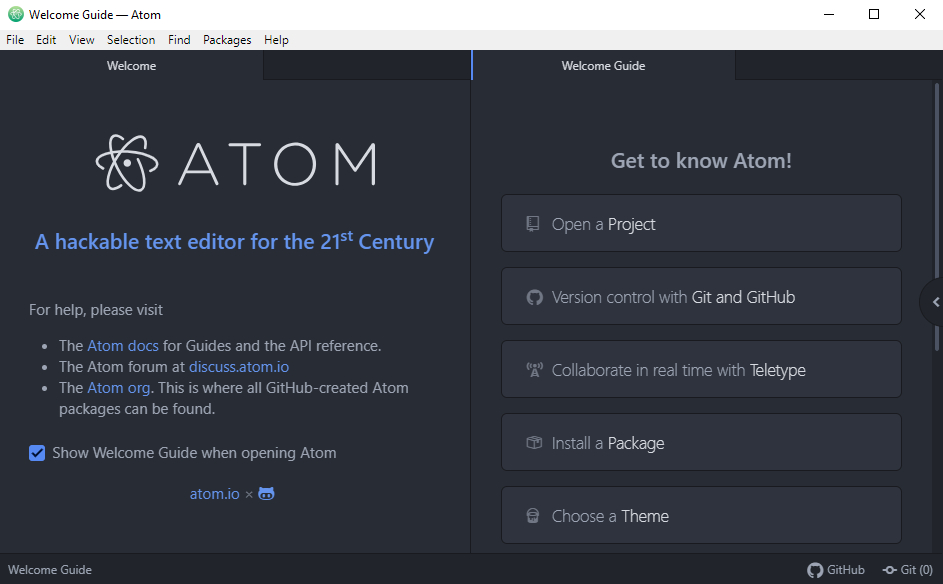 A hackable text editor for the 21st Century. Atom, a project started by Github and thus now owned by Microsoft, has established itself as one of the premiere code and text editors out there. The best part is that Atom is totally free, open source, and highly customizable. Built around a minimal core, Atom comes with multiple language-specific packages built in, and the library of community-written ones has exploded over the years since the editor was first released. Atom is as robust as you need it to be – if the editor doesn’t do something you need, you can create that feature yourself. The Teletype features has been embraced by users, too. It allows multiple developers to work on the same code from remote locations.
A hackable text editor for the 21st Century. Atom, a project started by Github and thus now owned by Microsoft, has established itself as one of the premiere code and text editors out there. The best part is that Atom is totally free, open source, and highly customizable. Built around a minimal core, Atom comes with multiple language-specific packages built in, and the library of community-written ones has exploded over the years since the editor was first released. Atom is as robust as you need it to be – if the editor doesn’t do something you need, you can create that feature yourself. The Teletype features has been embraced by users, too. It allows multiple developers to work on the same code from remote locations.
Platforms: Windows, MacOS, Linux
3. Sublime Text
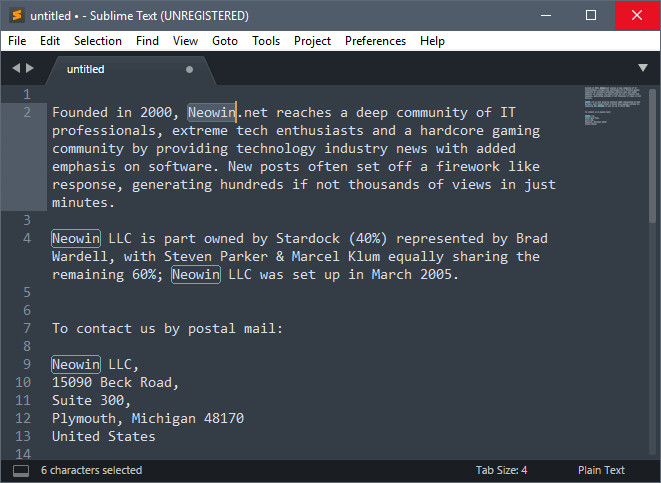 A sophisticated text editor for code, markup and prose. Sublime Text is pretty close to the industry standard for text editors. There’s a reason for that. Being designed for code, markup, and prose is a big plus. They haven’t put the same consideration into their prose workflows as say, Scrivener or Final Draft, but you have the option of doing everything within one editor. Like Atom and VS Code, Sublime Text has as an incredibly active package repository that extends its features far beyond the initial download.
A sophisticated text editor for code, markup and prose. Sublime Text is pretty close to the industry standard for text editors. There’s a reason for that. Being designed for code, markup, and prose is a big plus. They haven’t put the same consideration into their prose workflows as say, Scrivener or Final Draft, but you have the option of doing everything within one editor. Like Atom and VS Code, Sublime Text has as an incredibly active package repository that extends its features far beyond the initial download.
Platforms: Windows, MacOS, Linux
Price: FREE (technically it’s an indefinite, never-ending trial of the $80 upgrade)
4. Notepad++
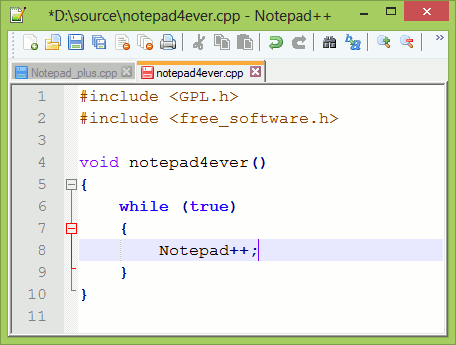 Notepad++ is an extremely popular text editor. That is in part because it’s free and GPL-licensed open source. Even more than that, though, the reason it’s one of the best text editors around is that it’s simple. It doesn’t try to be Atom or VS Code or Sublime Text. It’s a code editor, plain and simple. Beginners and veterans can get everything they need out of it. Coders and developers often recommend this one as a great option for someone just getting into code editing and might be overwhelmed by the environment offered up by others. Notepad++ is a wonderful, simple option not just for beginners, but developers at any level. A lot of professional devs use Notepad++ as their daily driver because it’s light, effective, and does what it needs to do.
Notepad++ is an extremely popular text editor. That is in part because it’s free and GPL-licensed open source. Even more than that, though, the reason it’s one of the best text editors around is that it’s simple. It doesn’t try to be Atom or VS Code or Sublime Text. It’s a code editor, plain and simple. Beginners and veterans can get everything they need out of it. Coders and developers often recommend this one as a great option for someone just getting into code editing and might be overwhelmed by the environment offered up by others. Notepad++ is a wonderful, simple option not just for beginners, but developers at any level. A lot of professional devs use Notepad++ as their daily driver because it’s light, effective, and does what it needs to do.
Platforms: Windows, Linux (a forked version exists)
5. Bluefish
Bluefish is more of an IDE than a real text editor, which means it may be a little advanced for brand new users. It’s free, supports pretty much every language because it’s open-source, and comes with a wide variety of useful features for use across many platforms. It’s constantly updated by the community that’s built itself around the editor and can handle some pretty complex code bases. You can edit in full-screen or wrap the text as you want, and the powerful search-and-replace tool keeps things tidy. The IDE also supports a lot of secure connections, so you won’t have to worry about a separate FTP client, as you can work on your sites and repos remotely from within Bluefish itself.
Platforms: Windows, MacOS, Linux, BSD, Solaris
6. Brackets
A modern, open source text editor that understands web design. Brackets is another free and open-source editor. This time, it’s not simply a community-driven project: Adobe itself is behind this one. Yes, the Adobe. Of Photoshop, Illustrator, and so on. Because of that, expect polish and power.
Brackets is designed to be minimal-yet-powerful. It does, however, offer some unique and useful features. One of those features being Extract, a tool which allows you to extract information such as colors, fonts, gradients, measurements, directly from PSDs as clean CSS. For front-end developers working in a design agency who have to recreate pixel-perfect sites from mock-ups, there may be no better tool for you.
Platforms: Windows, MacOS, Linux
7. Codeshare.io
Codeshare is an interesting product. It’s a free, browser-based code editor that lets anyone code for free. If you create an account, you can even save your code. This is absolutely not a daily driver. You won’t be working on every line of code of a project in this one. But if you are on a different computer, perhaps, or need to share your code with someone, that’s the intention for the product. The company mentions it being for interviews and such because you can invite people to video chat with you, and anyone who joins can see you code in real-time. Educators could get a lot of use out of this tool, too. Additionally, they have dozens of themes and syntax highlighting for all major languages. Keyboard shortcuts are integrated, too, and you can choose your favorite set: Sublime, VIM, or Emacs. In that alone, you can see how it’s meant as a temporary replacement for your everyday editor.
Platforms: Internet browsers
8. VIM
Vim is hardcore. Let’s be clear about that upfront. Where Sublime Text, Notepad++, and some of the other editors on this list are newbie friendly, Vim is unapologetic in its utilitarian brutalism. From the official website down to the software itself, Vim is a coder’s tool for coders by coders.
Once you get past the UI and the steep learning curve, you’ll see why the text editor is designed the way it is. It does roughly everything all the other best text editors can do. But more than maybe anything else on the list, it’s designed for efficiency and function. Watching people code in Vim is like watching a concert pianist. The UI is keystroke based, and if you thought the Sublime Text keyboard shortcuts were helpful, when and if you can get used to Vim, the experience is unreal. If you try to go back to a visual GUI for a text editor, you will feel like you’re working in slow motion.
Because Vim can be so intense to learn, they created a game for you to play to learn how it works. Not a tutorial, really, but a way not to overwhelm you with everything that makes Vim, Vim. It’s pretty fun.
Platforms: Windows, MacOS, Linux
9. GNU Emacs
Having included Vim, we feel compelled to include Emacs as well. For developers, Emacs and Vim have the same relationship as Pepsi and Coke, Star Wars and Star Trek, M&Ms and Reece’s Pieces. They’re almost two sides of the same coin in that they are absolutely designed for the best developer experience possible while cutting out many of the extraneous features that are barriers to efficiency. Emacs is lightweight, command-line based, and being a part of GNU, available totally for free across a plethora of operating systems.
Emacs takes a slightly more visually appealing approach to editing than Vim, however, that doesn’t mean you lose any power or functionality. It may come down to taste when deciding which one you want. But if you’re in the market for a hardcore, no-nonsense text editor and IDE that will pretty much be around forever, Emacs is definitely an option. After all, the core came around in 1976 and this particular iteration (GNU Emacs) has been updated regularly since 1984.
Platforms: Windows, MacOS, Linux, GNU, Solaris, FreeBSD, NetBSD, OpenBSD
10. Spacemacs
Now that you’re familiar with VIM and Emacs, let us introduce you to Spacemacs, whose tagline is The best editor is neither Emacs nor Vin, it’s Emacs and VIM. That tells you most of what you need to know about it right there. Instead of having to choose between the Pepsi and Coke of code editors, you get the best of both worlds in a new, open-source editor. Just because it combines the two into a nicer package than either has on their own doesn’t mean it’s any more accessible. Spacemacs is still absolutely not for beginners. It is complex and full of function over form, but that function is smoother in general than either of its constituent parts. The dev team and community have created a set of conventions and shortcuts for the editor that make it every bit as quick as either Emacs or VIM. If the idea of learning a hybrid of the two doesn’t scare you off, Spacemacs is totally worth looking into. And like its sources, Spacemacs is free, too.
Platforms: Windows, MacOS, Linux
11. Komodo Edit
Komodo Edit is a powerful but basic code editor. It offers multi-language support, multiple selections and autocomplete, plus the ability to track changes or view a Markdown version. There’s also a more fully featured IDE, which you’ll need to pay for.
Platforms: Windows, OS X, Linux
Price: Free
Top 7 Premium Code Editors
12. PhpStorm
JetBrains makes good products. One of their best is PhpStorm, a delightful IDE designed to make a PHP developer’s life better in so many ways. PhpStorm is more than a code editor. It’s a full PHP IDE (integrated development environment), which means you get debugging, version control (Git, for instance), testing, error checking, intuitive code navigation, and so much more within the software itself instead of having to keep multiple apps for each task. PhpStorm excels in nearly every area that an IDE consists of. The interface is clean and smooth, the IDE itself feels far more lightweight than it is, and there is support for tons of frameworks. Joomla!, WordPress, Drupal, Laravel, Magento…basically if you work in PHP, your framework is supported here. But not just PHP. You can’t do most PHP work without Coffee, JS, HTML/CSS, and lots of other front-end code, so JetBrains makes sure those are covered, too. Basically, this is your one-stop shop if you work in a PHP framework.
Platforms: Windows, MacOS, Linux
Price:
- Lightning-smart PHP IDE: $199 per year, $159/2nd year, $119/3rd year onwards
- All Products Pack: $649 per year, $519/2nd year, $389/3rd year onwards
13. WeBuilder
WeBuilder is a great tool for folks working in nearly any language, but shines with PHP, JavaScript, HTML, and CSS. It is powerful enough that veteran coders can be comfortable using it on a daily basis, and it’s easy enough to learn and use that beginners will feel comfortable starting out with it and growing into its advanced features. WeBuilder lets you set up code snippets to keyboard shortcuts for re-use so that you don’t waste time rewriting work you’ve already done, and it features IDE features like integrated FTP. Lightweight and fast, it doesn’t bog down or get sluggish like other IDEs. It is, however, only available on Windows.
Platforms: Windows
Price: $89.95, $59.95 (Personal), $199.95 (Team)
14. UltraEdit
UltraEdit is part of a family of developer products by IDM Computer Solutions. It can be used to edit HTML, PHP, JavaScript, Perl, C/C++, Python, and just about any other programming language. By all indications this editor is a solid entry on this list and has some industry clout to prove it. We’ve listed some key features below, but its full feature list is quite extensive and can be found here. As a premium product (compared to many on this list), it is clear that they are actively developing their editor to compete with the rest of the best.
Platforms: Windows, MacOS, Linux
Price: $79.95/year
15. CoffeeCup HTML Editor
The CoffeeCup HTML Editor is a simple tool for creating, organizing, and working on an HTML/CSS project. That’s what it does, even branding itself “The HTML Editor.” The devs are confident in their product, and it shows. They also offer a split view where you can see the edits you make in real-time (much like the Divi builder, but with code). CofeeCup isn’t just for HTML, however. It supports PHP development, as well as CSS and Markdown linting on top of the standard HTML.
There’s a free version and a premium version with more features, too. We are including this in the premium section because the features that you gain are well worth upgrading for, rather than staying with the free version.
Platforms: Windows, MacOS
Price: FREE, or $49 for a more feature-rich editor
16. Espresso
Espresso is a Mac-only code editor, but it can’t not be mentioned. It’s nearly an IDE, but works as smoothly and cleanly as Atom or Sublime. The program is fast, and it’s relatively powerful. What sets Espresso apart is the real-time editing that you can do in the code editing window as well as in the browser, too. Anything you code will reflect in the browser, and you have an intuitive drag-and-drop interface that updates the back-end on the fly. With a slew of plugins and themes and a focus on efficiency and speed, Espresso has a strong community and users who advocate for its use. Espresso is not free, but you can download a free trial from the website so that you can see if it fits your work.
Platforms: MacOS
Price: $79 (with FREE trial)
17. BBEdit
BBEdit by Bare Bones is a bit more advanced than the name lets on. It’s more of a product you graduate to if you’re a beginner who started with a simpler product and are looking to work in a bit more of a heavy-duty environment. BBEdit is full to the brim with professional-level features for creating, editing, and manipulating text for your coding projects. It is MacOS only, so keep that in mind as well.
Plus, their tagline is “It doesn’t suck,” so you have to respect that.
Platforms: MacOS
Price: $49.99
18. Coda
Coda by Panic Inc. is everything you need to hand-code a website in one app. You get a real-time rendering of your code, a beautiful UI is beautiful, and regular updates and improvements to the softwar. It has a plug-in repo like many text editors, and you can contribute to development even if you don’t write Cocoa, the scripting language for Coda plugins. There’s also an iOS app you can buy if you’re on the go, and it seems to be just as rich as the desktop version.
Platforms: MacOS, iOS
Price: $99 for MacOS, $24.99 for iOS
Bonus 1: NetBeans
NetBeans is an open-source code editor tool for developing with Java, PHP, C++, and other programming languages. With this editor, code analyzers, and converters. It allows you to upgrade your applications to use new Java 8 language constructs.
Platforms: Windows, MacOS, Linux
Price: Free
Bonus 2: Geany
Geany is a text editor which uses GTK+ toolkit. It also has certain basic features of an integrated development environment. The tool supports many filetypes and has some nice features. Geany is a powerful, stable and lightweight programmer’s text editor that provides tons of useful features without bogging down your workflow. It runs on Linux, Windows and MacOS is translated into over 40 languages, and has built-in support for more than 50 programming languages.
Platforms: Windows, MacOS, Linux
Price: Free
Bonus 3: PyCharm, RubyMine, and All Other JetBrains Products
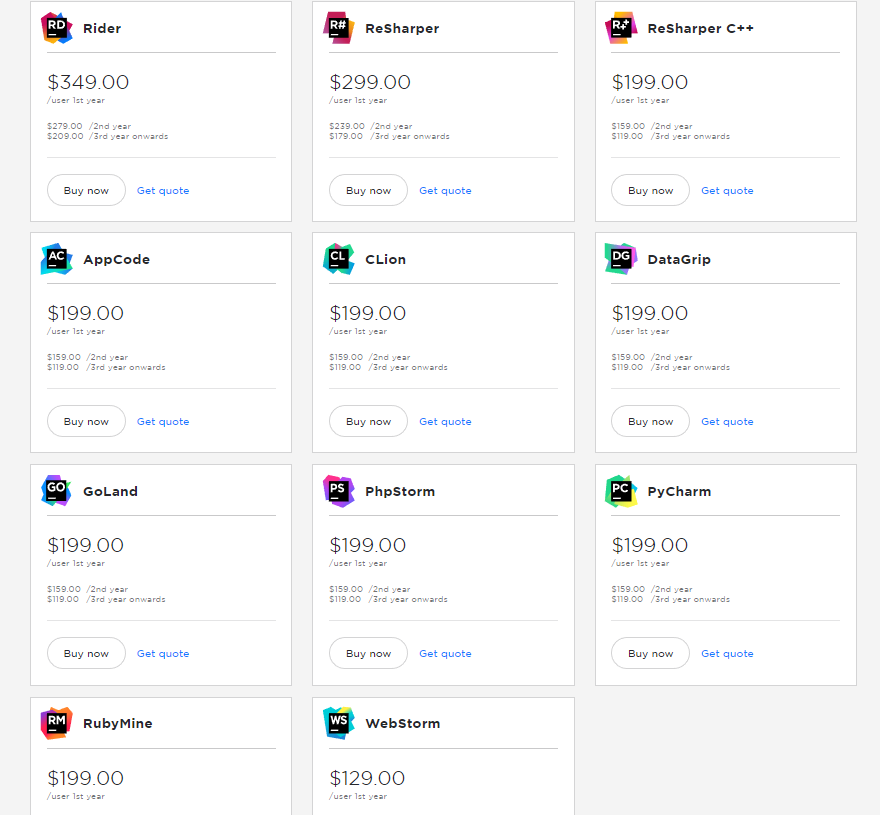
Like we said above, JetBrains makes good software. If you’re not a PHP dev, but like the way the PhpStorm IDE sounds, we think you should absolutely check out the full suite of JetBrains products. Most likely, there’s an IDE or product for you. PyCharm is one of the best Python editors out there, and RubyMine helped me personally move from an academic career and into one in tech. Whether you write in C++, C#, Go, or whatever else, JetBrains has you covered. Instead of programming one IDE that can be customized into an environment for your specific language (such as VS Code), they are able to create the ideal software for each language’s unique quirks and quibbles.
Price: Starts at $129 per year
Reference
- https://www.elegantthemes.com/blog/resources/best-code-editors
- https://mythemeshop.com/blog/code-editors/
-
https://www.guru99.com/best-free-code-editors-windows-mac.html
- Top Code Editors and IDE for PHP Development
- Top 7 Python Development IDEs for Python developers in 2020
- 35 thói quen làm cho code khó bảo trì